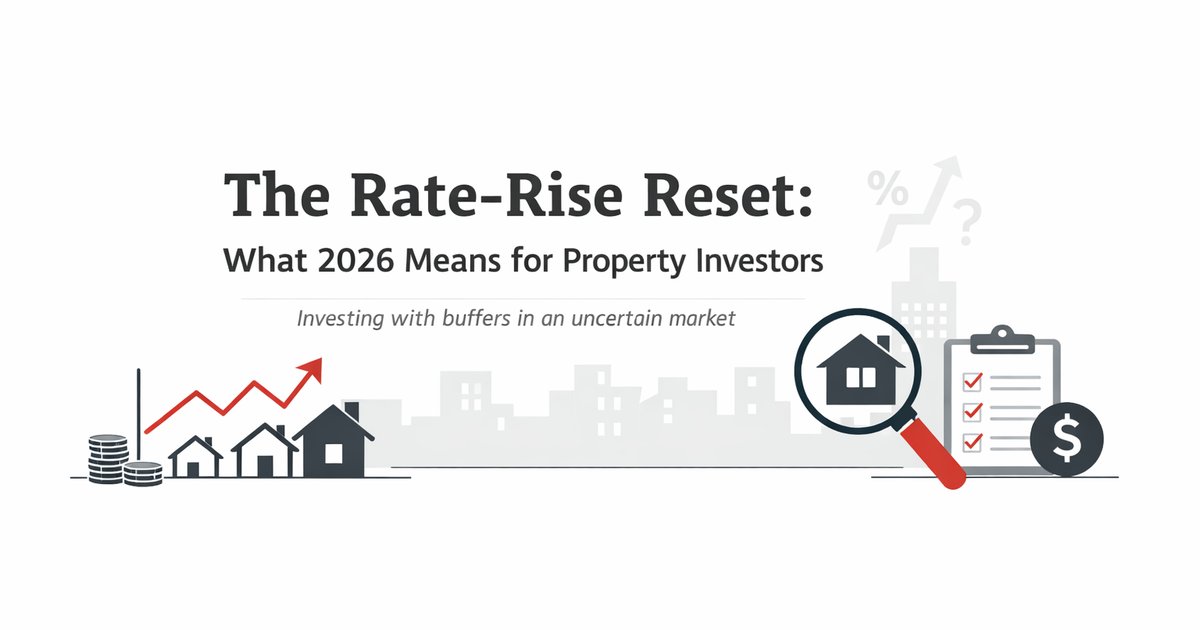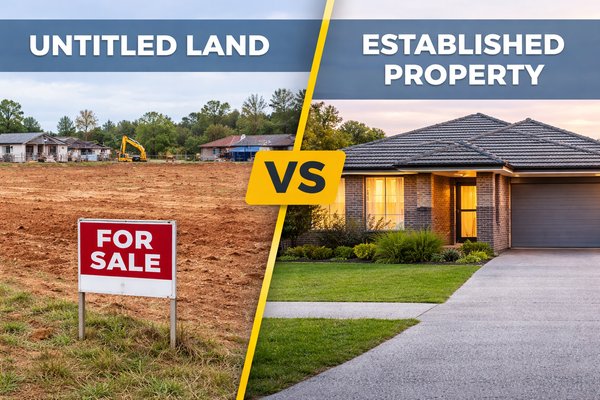In every hot property cycle, whether it’s Sydney’s inner west, Melbourne’s northern fringe, Perth’s coastal corridors, or fast-rising regional markets like Darwin, Townsville and Mildura, buyers rush in with one shared emotion: fear of missing out.
You see headlines about record prices, hear stories of friends doubling their money, and before long, your brain starts whispering, “If I don’t buy now, I’ll never get in.” That’s when investors begin making emotional choices, buying what everyone else has already passed on, stretching budgets, or settling for “good enough.”
But here’s the truth: the most successful investors are not the ones who say yes to everything. They’re the ones who’ve mastered the art of saying no. They pass on deals that look tempting but don’t stack up. They walk away when the numbers feel thin. They’re comfortable waiting while everyone else rushes.
Real power in property doesn’t come from constant action. It comes from restraint — from having the clarity to know when a deal will build your future, and when it will quietly drain it. Saying no isn’t hesitation; it’s strategy.
At AbodeFinder, we see this pattern every day. Investors who learn to pause, analyse, and reject the wrong deals early often end up with portfolios that perform stronger and grow faster because they protect their capital from avoidable mistakes.
So if you’re scanning listings across Australia, feeling pressure to jump in, take a breath. The best move you can make might be walking away from your next “opportunity.”
The Hidden Trap of Hot Markets
When Everyone’s Buying, Most Lose Discipline
Hot property markets create excitement, and that excitement can be dangerous. When everyone is buying, discipline often disappears. Auctions feel electric, social media is full of “sold above reserve” stories, and the pressure builds to act fast before prices climb higher.
But that rush often leads to emotional buying and poor judgement. Investors forget their numbers and start competing with the crowd instead of focusing on strategy. It’s the classic trap: doing what everyone else is doing, thinking that safety lies in numbers.
The smartest investors live by that rule. They act quietly, avoid attention, and move in the opposite direction of the hype. While others fight over the same listings, these investors are filtering, analysing, and preparing to strike when others burn out.
Take Mildura, for example. Demand there surged so fast that many buyers stopped questioning why some properties were still sitting on the market. Some snapped up houses next to train lines or in noisy industrial pockets, convincing themselves that “it’s still close to town, so it’s fine.” They weren’t thinking long-term; they were reacting. When the market cools, those same properties will be the hardest to sell and the first to lose value.
The lesson is simple: when you feel FOMO kicking in, step back. The crowd’s energy is the signal to slow down, not speed up.
What Happens When You Overpay for Mediocrity
When markets heat up, scarcity takes over logic. You tell yourself, “This will do, at least I got something.” That’s how investors end up overpaying for average assets that look safe but quietly underperform.
Buying near a train line, in a high-risk zoning area, or on the edge of a flood or bushfire zone might feel like a small compromise at the time. But years later, those details cost you through low tenant demand, higher insurance premiums, or poor resale appeal.
We’ve seen it play out time and again. In regional markets, insurance quotes can double simply because a house sits in a bushfire overlay. In city areas, homes backing onto train tracks might look affordable now, but struggle to attract quality buyers later.
Under pressure, many investors skip these checks. They don’t review zoning maps or compare insurance costs because they’re afraid someone else will buy first. But the truth is, patience pays. The property you walk away from today might save you hundreds of thousands in regret tomorrow.
At AbodeFinder, we use AI and data analytics to help you see these red flags before you commit. Our system filters out risky or overpriced listings, so you can stay focused on the opportunities that truly build long-term wealth.
The Power of Saying “No”, A Discipline Few Have
Saying No Protects Your Capital
Every successful investor eventually learns that their first job isn’t to grow money, it’s to protect it. Growth follows discipline, and discipline starts with the courage to reject deals that don’t measure up.
In property, your real enemy isn’t the market, the banks, or other buyers. It’s emotional decision-making, the part of you that wants to buy just to feel progress. When you say “no” to a deal that doesn’t fit your plan, you’re not missing out. You’re defending your position.
That restraint is what separates the professionals from the hopefuls. Many investors chase every opportunity that comes across their feed. The smart ones know when to walk away. They use clear rules and logic to protect their capital, because they understand one bad purchase can set them back years.
Think of saying “no” as a shield. It’s the move that keeps you in control when others are acting out of impulse.
The Psychological Edge of Patience
The best investors aren’t hustlers; they’re hunters. They wait, observe, and strike only when the conditions are right. They don’t need constant movement to feel successful; their confidence comes from clarity.
Some of the most experienced investors have reviewed thousands of properties and only purchased a handful. For every 1,000 deals they assess, they might buy 10. That’s a 1% success rate, and it’s deliberate. Each “no” brings them closer to the right “yes.”
This level of selectiveness builds mental strength. It trains you to filter noise, ignore hype, and focus only on opportunities that align with your long-term strategy. Investing is a process, not a race. The real wins come from following your system, not chasing emotion.
Patience isn’t passive. It’s the most active skill you can develop. When you slow down, you think clearer, negotiate better, and find higher-quality deals. It’s the power of controlled timing, the quiet confidence of knowing that opportunity will come again, and you’ll be ready for it.
At AbodeFinder, we help investors adopt this same mindset. Our tools filter thousands of listings using data and AI, so you only see properties that fit your strategy, not your impulse. We make it easier to say no to the wrong deals and yes to the ones that actually build wealth.
Real-World Examples of Smart Rejections
The Mildura Railway Line Deal
Mildura has been one of Australia’s regional hot spots in recent years, attracting investors chasing affordability and strong yields. On paper, many deals looked appealing: large blocks, decent rental returns, and proximity to amenities. But sometimes what seems good on a spreadsheet doesn’t hold up in real life.
One property, located on 11th Street in Mildura, ticked almost every box: close to schools, shops, and the CBD. Yet one fatal detail made it a poor choice: it backed directly onto a train line. While the trains only passed a few times a week, they were long and incredibly noisy. The house literally shook when they went by.
That single factor would make the property harder to rent and even harder to sell. Future buyers would simply compare it with quieter homes just a few streets away and walk away. This is where due diligence matters, checking for noise maps, zoning overlays, and nearby infrastructure before you get emotionally attached to a deal.
Good investors see beyond the short-term “deal” and assess what the next buyer will think. Long-term resale appeal matters more than short-term convenience.
The Bushfire Zone Property
Another property looked promising on the surface, a big block on Rural Drive, also in Mildura, offered solid development potential and even room for a granny flat. Everything about it seemed right until one small discovery changed everything: the house was in a high-risk bushfire zone.
That single detail meant higher insurance premiums and tighter planning restrictions. Building extensions or redeveloping later would become a headache. The property wasn’t unsafe, but the hidden cost made it less profitable than it first appeared.
The lesson? Don’t spread your energy or your money across risky or complex deals. Focus on properties that are safe, straightforward, and set you up for consistent growth.
In investing, small risks compound into big problems. A $2,000 higher annual insurance premium may seem small now, but over ten years, that’s $20,000 you could have used elsewhere. Smart investors play the long game; they focus their energy on fewer, safer opportunities that compound steadily.
The Darwin Public Housing Case
The third example comes from Darwin, where housing supply is tight and most deals happen off-market. One property in Moulden looked ideal at first: a large block, solid rental yield, and a low price compared to nearby suburbs. But a deeper look revealed that more than half the street consisted of public housing.
That changes everything. While there’s nothing wrong with public housing, a high concentration in one area can reduce rental stability and affect tenant quality. Investors may face longer vacancies, more maintenance issues, or tougher management experiences.
This is where newer investors often get caught out; they see a cheap price and good yield, but ignore the social and environmental factors that drive long-term performance.
The best deal isn’t always the cheapest. It’s the one that lets you sleep well at night, the property you can hold for years without constant problems. That peace of mind is worth far more than a few extra dollars in short-term rent.
At AbodeFinder, we help investors uncover these hidden risks before they buy. Our AI-based analysis filters through thousands of listings to highlight issues like noise exposure, zoning restrictions, and neighbourhood factors so you don’t end up with a property that looks good on paper but performs poorly in real life.
Wealth Comes from the Deals You Don’t Do
In every hot market, discipline is what creates real profit. It’s easy to buy something; it takes skill to walk away. The investors who build lasting wealth are the ones who stay calm when others rush, who protect their capital instead of chasing headlines, and who make decisions based on logic, not emotion.
The most successful property buyers reject nine out of ten opportunities they see. They understand that wealth doesn’t come from buying fast; it comes from buying right. Every “no” clears the path for the one “yes” that truly matters, the deal that fits their long-term strategy and lets them sleep peacefully at night.
Restraint, patience, and timing are what define professionals. When you combine those with data and insight, you stop gambling and start investing.
Ready to Invest Smarter?
Want to invest like a professional without falling for bad deals?
At AbodeFinder, we use data and AI to help you find high-growth suburbs, filter out risk, and buy smarter.
Start your free property strategy session today at abodefinder.com.au.
















